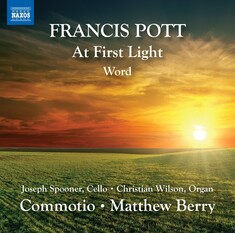At First Light
Word
Francis Pott’s acclaimed musical voice is one of uncommon eloquence and seriousness of purpose, and his works have been performed and broadcast in over 40 countries. This recording presents world premiere recordings of two major pieces. At First Light is a memorial work which takes the form of a series of slow meditations surrounding an exuberant motet, with wordless commentary from a lamenting cello. Word, with its significant role for the organ and the inclusion of texts by the Welsh priest and poet R.S. Thomas, reveals Gospel contemplation in a postmodern world.
Listen now
Purchase the album
"Pott responds...with a nine-minute contrapuntal marathon of dazzling virtuosity. It’s an endurance test to strain the limits of most choirs, but Oxford-based Commotio negotiate its punishing (and relentless) double-choir counterpoint with remarkable ease, unflagging energy testament to the singers’ commitment to the composer as much to Matthew Berry’s skills as director."
David Truslove
|
|
Francis Pott
Read an interview with Francis hereFrancis Pott began musical life as a chorister at New College, Oxford. He held Open Music Scholarships at Winchester College and then at Magdalene College, Cambridge, where he studied composition with Robin Holloway and Hugh Wood while pursuing piano studies privately in London with Hamish Milne. Throughout the 1990s he was John Bennett Lecturer in Music at St Hilda’s College, Oxford, as well as a member of the Choir of Winchester Cathedral, under the direction of David Hill. In 2001 he became director of London College of Music within the University of West London, subsequently leading research across all areas of the University’s Faculty of Arts. In 2007 the University appointed him to its first chair in composition, a post which he still occupies despite taking partial retirement in 2018 to devote more time to writing music. Pott’s works have been performed and broadcast in over 40 countries, widely published in the UK and released worldwide on some 40 albums. Winner of four national and two international composition awards, in 1997 he received First Prize in the piano solo section of the Prokofiev Composing Competition, Moscow. In 1999 A Song on the End of the World, his oratorio for soloists, chorus and orchestra, named after a poem written in Nazi-occupied Warsaw by Czesław Miłosz, was the acclaimed millennial Elgar Commission of The Three Choirs Festival, Worcester. The work was hailed by The Times and the Birmingham Post. In 2006 a further oratorio for tenor soloist, double chorus and organ, The Cloud of Unknowing, was acclaimed by Richard Morrison in The Times. In 2006 and 2011 Pott was a nominated finalist in the BASCA British Composer Awards (now the Ivors Composer Awards, staged in association with BBC Radio 3) in London. Recent pieces include chamber, choral and organ music. May 2017 saw the world premiere of Pott’s third major work for chorus and orchestra, the sea-inspired Requiem Cantus Maris, at the Royal Festival Hall, Southbank Centre, London.
|
"Throughout, Pott’s forty-minute-plus At First Light is served by singing of formidable accuracy and a cellist of peerless musicianship."
David Truslove
Joseph SpoonerJoseph Spooner’s diverse career has taken him across the UK, from the Baltic to the Atlantic, and from the recording studio to concert platforms in Continental Europe, Russia, New York, Mexico, and New Zealand. Notable chamber music collaborators have included David Owen Norris and Madeleine Mitchell. Spooner’s delving into the repertoire has led to the recovery of unjustly neglected works, and his efforts have been praised by International Record Review, Gramophone and The Strad. Recent years have seen the release of further recordings on various labels, including Rawsthorne’s Cello Sonata, Hesketh’s IMMH, Sea-Croon (an album of previously unexplored 1920s English music), and Sherwood’s Double Concerto (with the BBC Concert Orchestra and Rupert Marshall-Luck). Spooner was elected an Associate of the Royal Academy of Music in 2012 and is proud to be the dedicatee of works by Alwynne Pritchard, Errollyn Wallen and Martin Read. His instrument was made by Nicolas Vuillaume in c. 1865.
|
|

